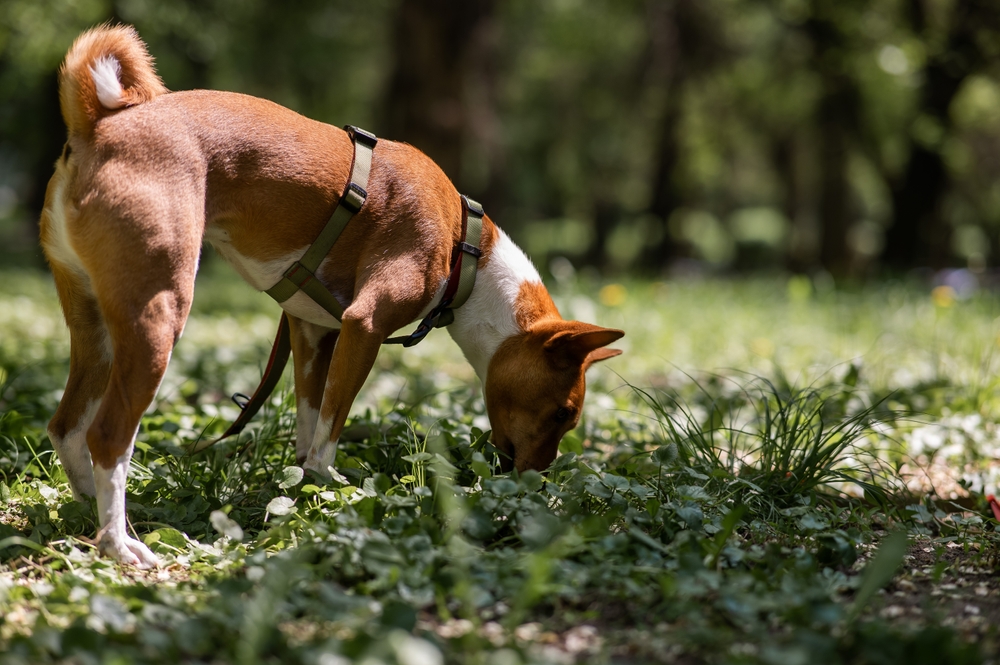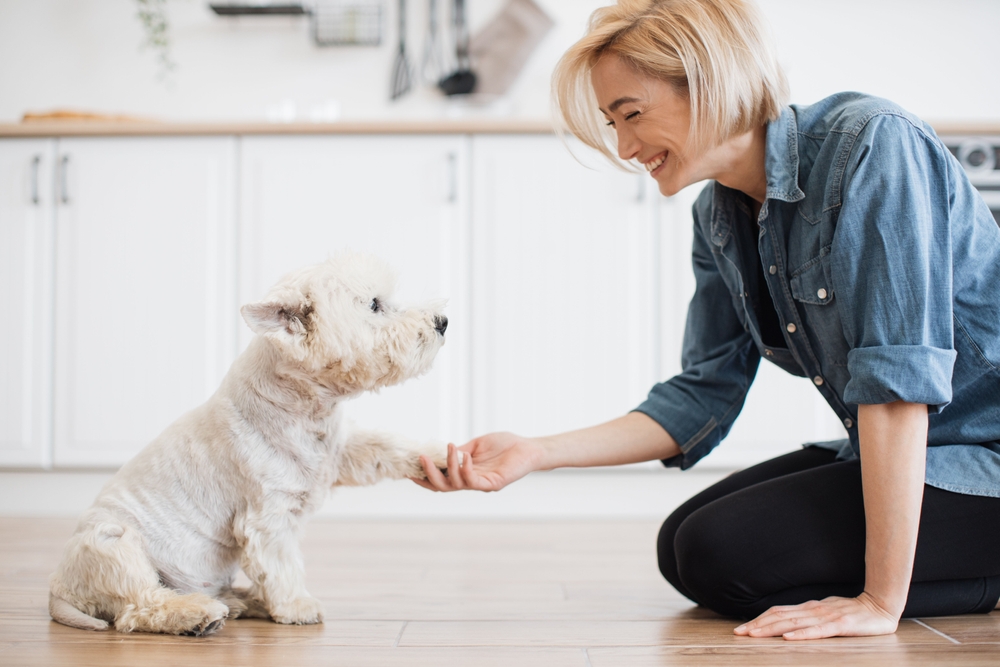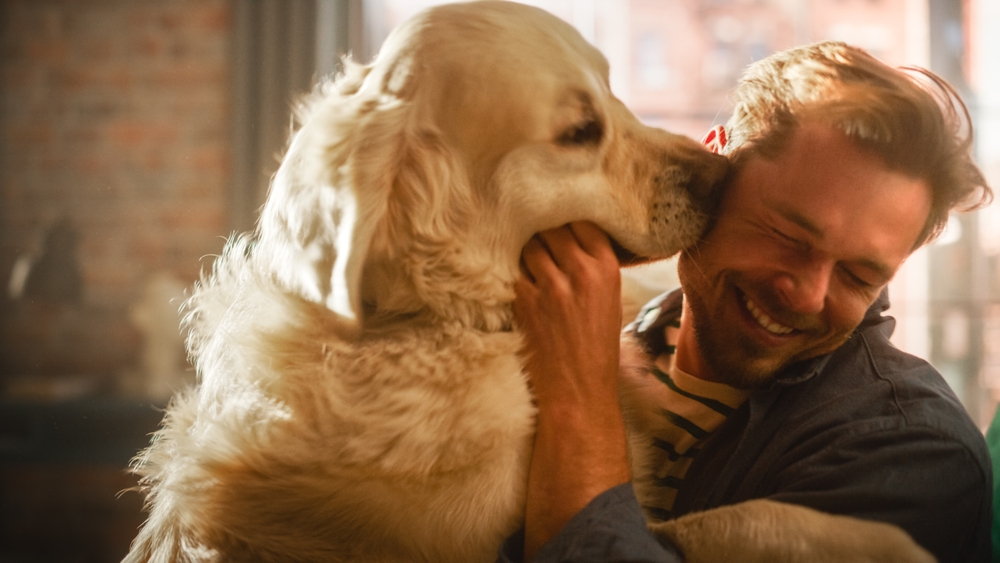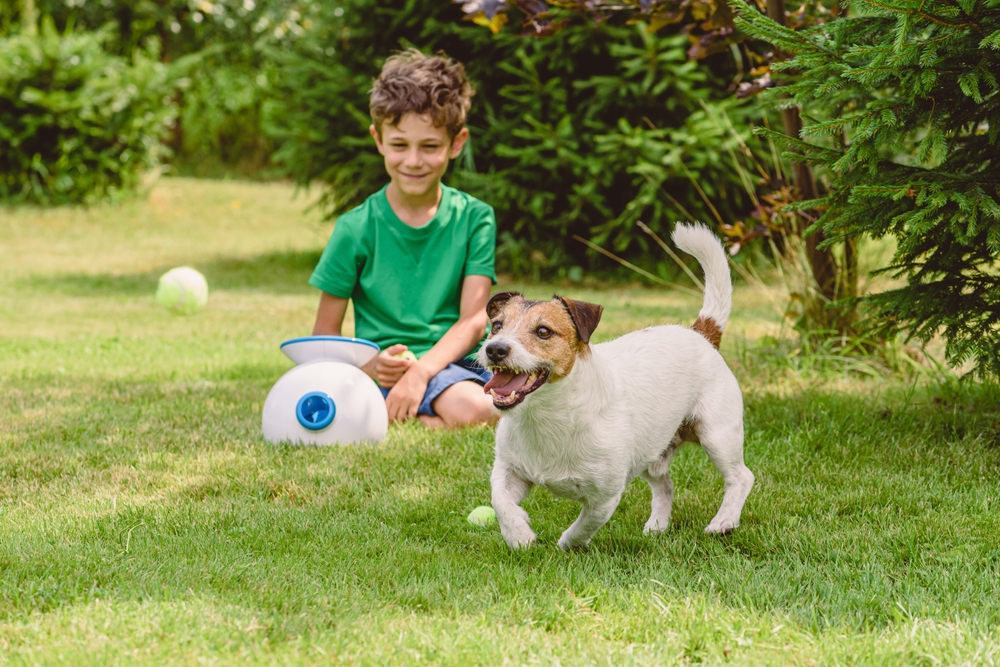Beyond the cute tricks, puppy dog eyes, and tail-wagging, our furry companions possess an intellect that goes unnoticed in the hustle and bustle of daily life. They see the world through a different lens, one that combines instinct, loyalty, and a surprising depth of understanding that often rivals our own..
1. They Show Emotional Sensitivity

Your dog likely understands your emotions better than you do sometimes. They are masters at picking up on subtle cues in your tone of voice and body language. Research published in Science Magazine shows that dogs use the same regions of their brain as humans do to process emotional sounds. This means that when you’re feeling down, they’re probably already by your side, ready to offer comfort. It’s a level of empathy that goes beyond simple conditioning, suggesting a deeper understanding of human emotions.
They thrive on these emotional connections, and it’s evident in their behavior. When you’re happy, they celebrate alongside you, their energy matching yours. Dogs have been known to mirror the emotions of their owners, reflecting feelings like joy or sadness. This isn’t just a coincidence; it’s a testament to their deep emotional intelligence. The next time your dog snuggles up to you in a moment of need, know it’s their way of saying, “I get it.”
2. They Speak Human Language

It’s not just commands like “sit” or “stay” that your dog understands. Many dogs can learn the meaning of hundreds of words over time. They pick up on keywords and associate them with specific actions or objects. This ability to understand language nuances is similar to how babies learn to talk. So, when you chat with your pup, they are likely processing and storing more information than you realize.
When dogs learn new words, it’s often through repetitive association. This is why consistent training and communication are essential. They understand the tone and inflection as much as the word itself. It’s a complex web of auditory processing that displays their cognitive skills. With patience and practice, your dog might surprise you with their vocabulary prowess.
3. They Have Strong Problem-Solving Skills

Your dog has an impressive ability to solve problems, often without any human intervention. Whether it’s figuring out how to open a door or finding hidden treats, their problem-solving skills are on point. According to Stanley Coren, a professor of psychology, dogs have the mental abilities of a 2-year-old child. This includes the capability to solve basic puzzles and understand cause-and-effect relationships. When you see your dog manipulating objects to achieve a goal, you’re witnessing their cognitive skills in action.
Watching a dog work through a problem can be quite enlightening. They often use trial and error, learning from mistakes, and adapting their approach. This flexibility in thought process shows an ability to strategize, even if on a basic level. Dogs also use observational learning, watching and mimicking both people and other animals. It’s a fascinating glimpse into their curious and capable minds.
4. They Have Exceptional Memories

Dogs possess a remarkable capacity for memory, particularly in recognizing routines and familiar faces. They remember people, places, and experiences much better than we might expect. This is why they know exactly what time to expect their walk or dinner. They associate specific activities with particular times of day, thanks to their impressive internal clock. This ability to remember and anticipate shows a level of intelligence that is often underestimated.
The memories they form aren’t just about routine; they also remember emotional experiences. A positive encounter can lead to a lifelong friend, while a negative one might create a fear or aversion. This emotional memory plays a crucial role in their behavior and reactions. It’s why socialization is so important for puppies during their formative weeks. Understanding their memory capabilities can help you train and interact with them more effectively.
5. They Read Social Cues

Dogs are adept at reading social cues, both from people and other animals. They can discern between friendly and aggressive behaviors based on subtle signals. According to research, dogs are capable of understanding and responding to human gestures, like pointing, better than even chimpanzees. This ability to gauge social situations makes them excellent companions and protectors. Their ability to understand these cues keeps them in tune with the dynamics of their environment.
Your dog’s social intelligence is evident in how they interact during playtime. They know when to adapt their energy levels based on the company they’re with. This means they can be gentle with children or more robust with fellow canine friends. Their understanding of social hierarchies is also impressive, as they often submit to older or more dominant dogs. This nuanced grasp of social structures is a testament to their cognitive abilities.
6. They Have Next-Level Senses

Your dog’s sense of smell is legendary, but it’s not their only heightened sense. They perceive the world through a combination of smell, hearing, and sight, far surpassing human capabilities in some areas. This multi-sensory approach allows them to detect changes in their environment long before we do. For instance, dogs can hear frequencies that are completely inaudible to humans. It’s their finely tuned perception that alerts them to your arrival long before you’ve reached the door.
Their sensory superiority makes them exceptionally well-suited for jobs like search and rescue. They can track scents over long distances and identify hidden objects with ease. This natural ability has been harnessed throughout history to assist humans in various tasks. From hunting to guiding the visually impaired, their senses provide them with a unique skill set. Appreciating these abilities helps us understand and utilize their talents more effectively.
7. They Are Fast Learners

Dogs are incredibly adaptive learners, capable of adjusting their behavior based on past experiences. They use this ability to navigate new environments and challenges with ease. A study from the University of Veterinary Medicine Vienna highlighted how dogs learn to anticipate and react to their humans’ behavior. This adaptability is why they can adjust to different lifestyles and living situations with minimal stress. Such flexibility is a testament to their cognitive resilience and intuition.
This adaptive nature also makes training more effective. Dogs are quick to pick up on patterns and adjust their responses accordingly. This means consistency in training is key to reinforcing desired behaviors. It’s their capacity to learn from both positive and negative outcomes that shapes their behavior. When we recognize and support their learning process, we help them harness their full potential.
8. They Know How To Heal Intuitively

Dogs seem to have an innate ability to offer comfort and healing to those in need. Many people report that their dogs naturally gravitate towards someone who is ill or upset. This intuitive behavior is more than just a comforting presence; it’s a form of emotional support. Their calming influence can lower stress and anxiety levels in their human companions. Through this instinctive empathy, dogs play a crucial role in emotional well-being.
This healing intuition is why therapy dogs are becoming increasingly popular in hospitals and care facilities. These trained animals provide comfort and improve the mental health of patients simply by being present. It’s not just about companionship; it’s a therapeutic interaction that supports recovery. Dogs’ natural ability to sense and respond to human emotions makes them ideal for such roles. Their presence offers a unique form of therapy that transcends words.
9. They Have Sharp Communication Skills

Your dog communicates with you and the world in sophisticated ways. They use a combination of vocalizations, body language, and facial expressions to convey their needs and emotions. This form of nonverbal communication is highly effective, often conveying more than words could ever express. Through consistent interaction, you learn to understand their “language,” fostering a deeper bond. This ability to communicate complex messages is a sign of their advanced cognitive abilities.
Interactions with your dog reveal their understanding of reciprocity in communication. They listen and respond to your cues, waiting for the right moment to interject a bark or nudge. It’s a dance of interaction that strengthens your connection over time. This back-and-forth exchange fosters a relationship built on mutual understanding and respect. Dogs’ eagerness to communicate is a testament to their intelligence and desire for connection.
10. They Have Spatial Superpowers

Dogs have an impressive sense of spatial awareness, which allows them to navigate their environment with ease. They remember the layout of familiar spaces and can quickly adapt to new ones. This spatial intelligence helps them assess their surroundings and respond to changes effectively. It’s why they rarely bump into things, even in the dark. Their keen sense of space shows an understanding of depth, distance, and perspective.
This ability is particularly evident in dogs trained for agility sports. They maneuver through complex courses with precision and speed, demonstrating their spatial capabilities. It’s not just about following commands; it’s about understanding their body in relation to the environment. This skill is also beneficial in daily life, helping them avoid obstacles and assess safety quickly. Their spatial awareness is a testament to their physical intelligence and adaptability.
11. They Can Recognize Patterns

Dogs excel at recognizing patterns, whether in daily routines, environments, or even in human behavior. They notice the steps you take before leaving the house and may react accordingly. This ability allows them to anticipate future events, making them seem almost prescient at times. Recognizing these patterns helps them feel secure, as they understand what to expect. It’s a skill that highlights their ability to learn and adapt to their human’s lifestyle.
This pattern recognition isn’t limited to their immediate surroundings. Dogs can identify patterns in tone and behavior, adjusting their own responses accordingly. This makes them sensitive to changes in your mood or routine. It’s a subtle skill, but one that plays a big role in their adaptability and social interactions. By understanding the patterns in their world, dogs find harmony and balance in their lives.
12. They Have Quick Reflexes

Your dog’s quick reflexes are more than just a physical trait; they’re a sign of sharp mental processing. They can react to stimuli in their environment with impressive speed and accuracy. This quick thinking is essential for survival, allowing them to respond to threats or opportunities instantly. Whether catching a ball mid-air or dodging unexpected obstacles, their reflexes showcase their cognitive agility. It’s an ability rooted in both instinct and intellect.
These lightning-fast reactions are evident when playing fetch or navigating tricky terrain. Dogs rely on a combination of muscle memory and situational awareness to perform complex movements. This skill is especially important for working dogs, who must respond to commands and situations rapidly. Their reflexes are a testament to their physical and mental prowess, working in harmony. This synergy is what makes them such versatile and capable companions.
13. They Never Forget A Face

Your dog is likely better at recognizing faces than you might think. They can distinguish between familiar and unfamiliar people, often showing a preference for those they know. This ability to recognize faces is a product of their strong visual acuity and social intelligence. They rely on facial cues to interpret emotions and intentions. It’s a skill that reinforces their social bonds and understanding of human behavior.
When your dog greets you with enthusiasm, it’s because they recognize your face and associate it with positive experiences. This facial recognition is part of what makes them such loyal companions. They understand the nuances of human interaction, responding to familiar faces with trust and affection. This ability extends to recognizing other animals and even objects that resemble faces. It’s a fascinating aspect of their cognitive skillset that enhances their interactions with the world.
14. They Can Navigate Like A GPS

Dogs possess an uncanny ability to find their way, even in unfamiliar territory. Their navigational skills are a blend of instinct, memory, and sensory perception. They use landmarks, scents, and environmental cues to chart a course. This sense of direction is why some dogs can find their way home from miles away. It’s a remarkable skill that highlights their innate understanding of geography and spatial orientation.
These navigational abilities are not just about finding home; they’re essential for daily exploration. Dogs enjoy new environments and can quickly acclimate to changes in terrain and layout. This skill is particularly evident in breeds that were historically used for hunting or herding. Their ability to navigate complex terrains is a vital part of their working heritage. It’s a testament to their intelligence and adaptability in diverse settings.
15. They Anticipate Your Needs

Dogs have a knack for anticipating their humans’ needs, often before they are expressed. They pick up on routines and subtle cues that signal what might happen next. This anticipation allows them to align their behavior with your expectations, creating a harmonious living environment. Whether it’s bringing you a toy when you’re sad or nudging you for a walk at the usual time, they seem to know just what you need. It’s a skill that underscores their loyalty and desire to please.
Their ability to anticipate is rooted in their deep bond with you. They observe and learn from your daily actions, adjusting their responses accordingly. This creates a sense of predictability and stability in their world. It’s part of what makes the human-dog relationship so special and enduring. By understanding and anticipating your needs, dogs become more than just pets; they become partners in life.
